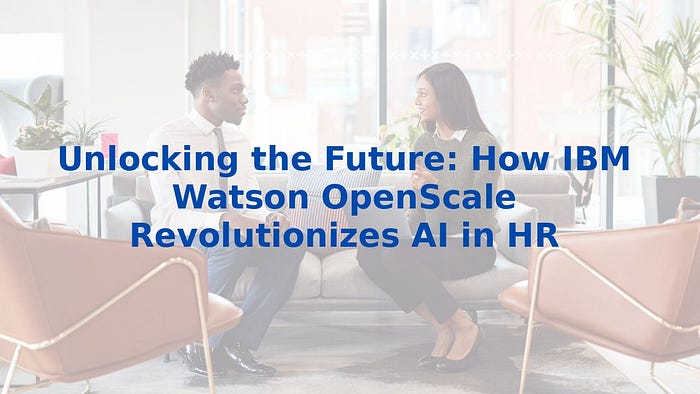Unlocking the Future: How IBM Watson OpenScale Revolutionizes AI in HR
The Big Blue has always been known as a leading innovator in the AI space. Now, with IBM Watson OpenScale, we are looking at an empowered generation of AI developers, new ideas to plug AI skill gaps, and ways of nipping AI biases at the bud. What does this mean for the global HR tech industry? Let’s find out.
From AI Pioneering to HR Transformation
IBM Watson’s journey in the AI realm began in 2011 as a straightforward question-and-answer engine. Today, it encompasses a vast suite of tools aiding technology pioneers across multiple industries in adopting AI. For human resources, IBM offers a specialized AI-based Talent & Transformation suite derived from Watson services. However, IBM’s latest innovation, OpenScale, promises to reshape how HR departments embrace AI.
The Elevation That is IBM Watson OpenScale
Introduced to tackle common AI adoption challenges, OpenScale by IBM addresses issues such as understanding AI-driven decisions, bridging the AI skills gap, and managing multi-vendor AI environments. Modern HR ecosystems often use AI in recruitment, employee self-service, payroll automation, and more. OpenScale seeks to unify these diverse technologies, ensuring seamless progression across verticals despite AI silos.
IBM Watson OpenScale strives to answer these questions and more.
Also read: IBM Unveils Watson Recruitment’s New Capability: Adverse Impact Analysis
Understanding IBM Watson OpenScale’s Role in HR
IBM’s extensive experience in AI has made it well-aware of the pain points associated with AI adoption, especially for burgeoning HR tech companies aiming to scale swiftly using diverse AI tools without introducing business complexities.
OpenScale allows businesses to operate and automate AI across various environments while providing transparency regarding how AI systems make decisions. To mitigate the AI skills gap, IBM introduced Neural Network Synthesis (NeuNetS), which automatically generates tailored neural networks using up-to-date HR data.
The implications are monumental: integrating AI into different runtime environments using Amazon, Microsoft, or custom AI engines becomes more feasible. Certain features are pivotal in easing AI adoption.
Unlocking OpenScale’s Potential
1. Scalability with Trust and Transparency: Concerns about data inputs and the validity of AI recommendations are increasing within HR departments. For example, Amazon’s experimental AI recruiter perpetuated biases from historical hiring data. OpenScale offers explainability for black-box models, automatic bias detection, and traceability of AI applications.
2. Addressing the AI Skills Gap: Tools like NeuNetS help close the talent gap by automatically tailoring AI models to specific business or HR needs, achieving expert-level accuracy swiftly.
Also read: IBM Sets its Sights on AI Skills Training: Here’s What You Need to Know
3. Accelerating AI Projects: Unlike many AI solutions, OpenScale is designed for both technical and business users. It gives HR product designers and company leaders transparency into AI outcomes, aiding in better decision-making regarding products and strategies.
“When you look at AI today it’s fairly isolated to the builders of the world — the data scientists and the developers — through API services. But we’re finding that the businesses don’t really trust how that AI is operating. That’s why AI OpenScale provides a dashboard geared more toward the business and operations people, so they can really understand how their AI is performing,” said Ritika Gunnar, IBM’s VP of Watson and AI.
Moreover, OpenScale ensures regulatory and corporate compliance, making it easier to secure C-level support and funding for new HR tech projects.
The Next Chapter for IBM Watson in HR
IBM’s venture into the HR segment isn’t new. They offer the Talent & Transformation suite, recently integrated into a Watson solution, powered by a partnership with Workday. This suite tackles recruitment, screening, career coaching, talent creation, and bias impact analysis.
While these tools deliver turnkey AI solutions to HR teams, OpenScale takes a distinct approach. Its unique selling proposition lies in its flexibility concerning vendors, model generation, and business decision-making.
Applications of this technology extend beyond HR, though the number of potential use cases in HR is particularly high due to the industry’s reliance on multiple AI vendors and AI-augmentable manual tasks.
Also read: What’s Next for AI in HR?
What are your thoughts on IBM Watson OpenScale’s impact on HR? Share your views on Twitter, LinkedIn, or Facebook. We’re always listening!
Explore our offerings at: Complete AI Training, see the complete list of courses at Courses A-Z, check out AI certifications at AI Certification, and sign up for unlimited access at Complete AI Training Portal.



